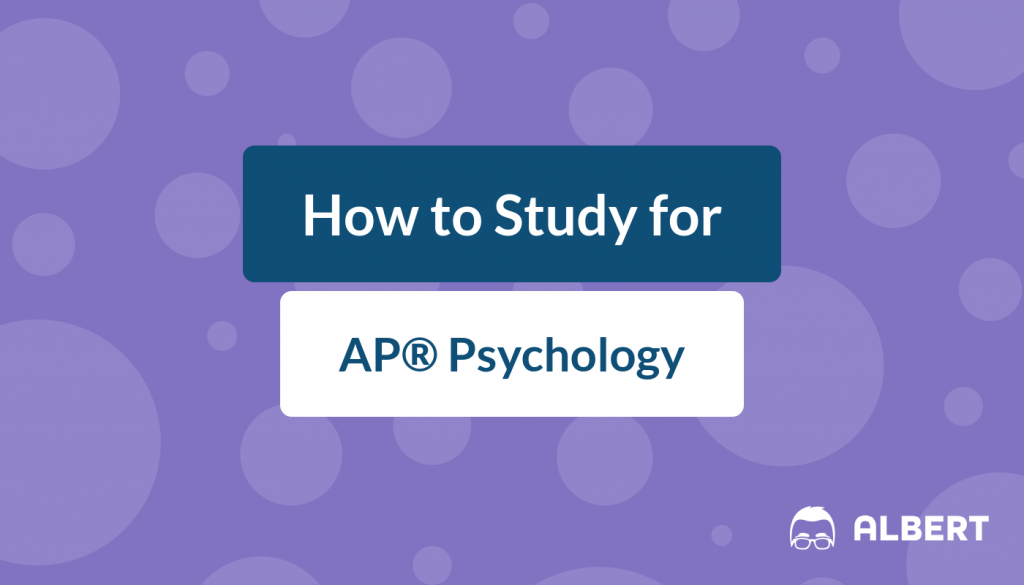Introduction
So, you’ve decided to take an AP® Psychology course, and now you’re wondering how on earth you’re meant to go about studying for the exam. Well, you’ve come to the right place. AP® courses are never an easy undertaking, especially when they cover a topic as complex as the human mind, but hopefully, through this simple guide, we can help you create an AP® psych study plan that will prepare you for getting that well-deserved 5 on the exam.
Through this AP® Psychology study guide, we’ll take you through three super easy steps to ensure you’ve got all your bases covered on the day of the exam. The steps are figuring out exactly what content will be covered on the exam, understanding the format, and finally, practicing by testing yourself repeatedly. You might be thinking that these seem like pretty generic steps. You’re right. You can apply these steps to pretty much any AP® exam, but this guide is unique because we’ve already done all the research for you! We’ll go through the steps, providing you with all the information, resources, and AP® Psychology tips specific to the exam. Let’s get started.
AP® Psychology Study Guide Step 1: Figure Out What’s on the Exam

While you might have taken other AP® exams before, it’s important to remember that the format for each AP® course exam is not always the same. Make sure you are aware of what to expect for this particular exam, so you are not caught off guard and can tailor your AP® Psych study plan the right way.
AP® Psychology Topics and Learning Objectives
The AP® Psychology course is made up of 5 major units, all of which you should incorporate into AP® psych study plan. The problem many students tend to have is not knowing how much time to study each of the 5 topics.
Below, we’ll list each topic and the main points you’ll need to know. For each one, we’ll link a set of flashcards, a review video, and some crash courses, too. This way, you will be able to create your own AP® psych study plan based on the relative importance of each topic and your strengths and weaknesses. Be aware, though, that the bullet points of resources may not cover everything you need to know about that topic.
Unit 1: Biological Bases of Behavior
Most of the AP® Psychology course focuses on behavior – but all behavior has a biological basis. You’ll be expected to understand neuroanatomy and the physiological and genetic processes that drive behavior. These are the main areas you should focus on according to the CollegeBoard:
- Interaction of heredity and environment
- Structure and function of the nervous system
- Neural transmission and brain function
- Sensation and perception
Here are some resources you can use to study:
• Review Videos:
‣ Neurons
‣ General
‣ Sleep
• Albert.io Crash Course Review:
‣ What’s the Difference Between Afferent and Efferent
Unit 2: Cognition
Cognition refers to thinking, learning, and memory. While learning has its own category in AP® Psych, this unit focuses on key cognitive processes like memory, language, and problem-solving. Be sure to understand:
- Thinking: How we process and analyze information
- Problem-solving and Creativity: Approaches to solving challenges
- Language: Structure and use in communication
- Memory: Encoding, storage, retrieval, and memory disorders
Here are some resources you can use to study:
• Flashcards:
‣ Thinking
‣ Memory
• Review Videos:
‣ Language
Unit 3: Learning and Development
This unit covers how humans develop and learn throughout life. Expect questions on learning theories and developmental psychology, especially in free-response sections. Key topics include:
- Classical and Operant Conditioning: Understand how we learn through associations and consequences.
- Social Learning: Learning by observing others.
- Lifespan Development: Physical, cognitive, and emotional growth from childhood to adulthood.
- Heredity vs. Environment: The role of nature and nurture in development.
Here are some resources you can use to study:
• Review Videos:
• Albert.io Crash Course Review:
Unit 4: Social Psychology and Personality
In this unit, you’ll explore how social dynamics and personality traits shape behavior. Social psychology focuses on understanding group dynamics, attitudes, and cultural influences, while personality psychology examines how we assess and measure personality traits. Key topics include:
- Attitude formation and change
- Group behavior, conformity, and obedience
- Attribution and interpersonal perception
- Theories of personality (psychoanalytic, humanistic, trait-based)
- Personality assessments and their pros and cons
Here are some resources you can use to study:
• Review Videos:
‣ Prejudice and Discrimination
‣ Group Dynamics, Aggression, Altruism
Unit 5: Mental and Physical Health
This unit explores psychological disorders, treatments, and the connections between mental and physical health. Important topics include:
- Psychological Disorders: Understanding categories like anxiety, depression, and schizophrenia.
- Treatment Approaches: Behavioral, cognitive, and biological therapies for mental health.
- Health Psychology: The impact of stress, lifestyle, and positive psychology on well-being.
- Positive Psychology: Emphasizing strengths and well-being.
Here are some resources you can use to study:
• Review Videos:
‣ Depressive and Bipolar Disorders
‣ Schizophrenia and Dissociative Disorders
AP® Psychology Study Guide Step 2: Understand the Exam Format

The AP® Psych exam consists of just two sections and lasts two hours and 40 minutes. The first section is the multiple-choice part. You will have 90 minutes to complete 75 multiple-choice questions that range across all the various topics covered in the course. This part is worth two-thirds (66.6%) of your score.
After the first section, you will have a break. The second part of the exam will then be the free-response questions. You will have 70 minutes to write an essay-style answer to two questions. Each question will usually have multiple parts you will have to address. This section is worth a third (33.3%) of your score.
Now, all this might seem pretty straightforward, but there are a few test-taking strategies you might want to keep in mind to maximize your time, especially if you are a slower reader or writer.
AP® Psychology Tips for the Exam: Multiple Choice
You will have 90 minutes for the first section to answer 75 questions. This gives you, on average, a little over a minute per question. If you haven’t studied much and each question is a challenge, then that’s not a lot of time. Luckily, the fact that you’re reading this is a sign that you plan to be well-prepared for this exam.You should be able to answer many of the questions well within that limit, leaving you more time to think about the handful of more difficult questions you will encounter.
For those more difficult questions, it’s important to remember that you will NOT be deducted points for wrong answers! If you are unsure about an answer, eliminate the options you are sure can’t be correct, and then pick your best guess from the remaining options. ALWAYS put down a choice, though – even a 25% chance is better than 0%.
AP® Psychology Tips for the Exam: Free Response
For the free response questions, make sure you take a minute to read both questions and briefly outline how you will answer them. This way, you will better understand how to divide your time between them because a 50-50 split in your time may not always be the best option. If you think one question will take up more of your time, then leave yourself that time! Check your watch when you start writing the response to your first question, set a time limit for yourself, and stick to it!
For these free response questions, answer each part if there is more than one. Remember, if the question itself is divided up into A, B, C, you don’t have to make it all flow together in a single essay – you too can label parts A, B, and C and answer each question on their own. You are still expected to use complete sentences, however, and make coherent arguments. Always include examples if you can.
The free-response questions will tend to start with directive words. These will give you an idea of how much detail you need to go into and how much time you should spend on each part. If a question starts with the words explain, discuss, or relate, you should give a more lengthy answer that includes definitions and examples of the topic and its relevance to a bigger picture. If a question starts with show or describe, you are expected to give an example of the concept in question that demonstrates your understanding. If the question says something like identify, you only need to name the concept and don’t need to go into too much detail (if you have time left however, this never hurts).
If, for some reason, you do run out of time and you’re still far from being done when the examiner announces, “10 minutes remaining,” there’s still a way for you to earn some points, as long as you don’t panic. Rather than rushing to finish your essay as fast as you can with sloppy handwriting and having to close your booklet in the middle of a sentence, make an outline of the main points you were going to include (try to write short but complete sentences if you have time). Remember, the reviewers are not scoring your spelling, grammar, writing style, or prose; they are scoring your knowledge of psychology. If you’re short on time, skip the fancy language and just stick to the facts.
AP® Psychology Study Guide Step 3: Test Yourself!

As you’ve hopefully already learned through your AP® Psych course, the key to solidifying any behavior is practice and repetition. This isn’t just a fact you need to remember for the exam – it’s also something you can apply in your studying! The best way to prepare for the AP® Psychology exam is to test yourself using practice exams from previous years and review questions from other sources.
When you’re first starting out with your reviewing and studying, don’t worry too much about setting a time limit on your practice exams. You may even find it helpful to have your notes or a review book right next to you so you can immediately look something up that you don’t remember. This will help you out in the beginning stages of your study plan.
Eventually though, as you get closer to the exam date and in order to get the most out of these practice sessions, it’s important that you set it up just like you would if it were the real thing. Sit at a desk in a quiet room with no distractions. Yes, that means turn your phone off and put it aside as well. Set an alarm to give yourself only the amount of time you would have for each section if it were the real thing: 90 minutes for the multiple choice and 70 minutes for the free response. Take your practice tests seriously; they will show you what areas you need to work on the most in your study plan.
After you’ve completed your practice test, go over your answers carefully. Don’t just count up your score and call it a day, because the real learning comes from going back and finding the correct answers to the questions you got wrong. Make sure that you understand why it is that the answer you chose was incorrect. Was your knowledge of the material lacking or did you fall into a trap set by confusing wording? Being able to recognize what kind of tricks previous exams have used will help you prepare for them in your own exam.
Another helpful thing to do may be to note which of the key topics each of your incorrect answers is related to. You may notice a pattern showing that you need to spend more time reviewing a specific area than you thought.
AP® Psych Practice Test Resources:
• The Albert.io AP® Psychology section offers hundreds of questions aligned to the topics and objectives of the AP® Psychology exam.
• You can find some official sample questions from the CollegeBoard here in their course description booklet.
• You can see the free response questions from previous years as well as their scoring guides here on the CollegeBoard website.
• Finally, review books are a great resource for study questions and usually have at least one entire practice exam.
Wrapping Up
Hopefully, you’ve found this AP® Psychology study guide helpful in directing your study plan and providing you with the information you need to excel on the exam. You now have a way of organizing your studies by the 5 key topics and have plenty of resources to refresh any areas in which you need more work.
Looking for AP® Psychology practice?
Kickstart your AP® Psychology prep with Albert. Start your AP® exam prep today.








